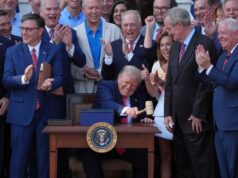Spaniards go to the polls on Sunday in a general election that offers a choice of two starkly contrasting visions.
Socialist Pedro Sánchez has been prime minister since 2018.
He hopes his government’s social reforms, crisis management and handling of a strongly performing economy will persuade voters to keep him in office.
But his party has been lagging in polls behind the conservative People’s Party (PP) led by Alberto Núñez Feijóo, who may end up needing far-right support.
This is the first Spanish general election of modern times held in the searing heat of mid-summer, when many Spaniards are on holiday.
Mr Feijóo, 61, caused controversy during the campaign by appearing to cast doubt on the management of postal votes, which has surged to around 2.5 million.
Polling for the rest of Spain’s 37 million voters takes place from 09:00 to 20:00 (07:00-18:00 GMT).
The conservative leader wants to roll back many of the Socialists’ reforms, but to form a majority in Spain’s 350-seat parliament he may turn to far-right Vox.
Vox leader Santiago Abascal is a Spanish nationalist whose popularity has been driven as much by a fierce opposition to Catalan separatism and feminism as by anti-immigration policies.
“This will be a victory of progress over backwardness, the future over the past, truth over lies,” Mr Sánchez has said. “The right is focusing on telling lies, we are focusing on making a comeback.”
Since 2020, Mr Sánchez, 51, has led the first coalition government of Spain’s modern era together with Unidas Podemos, to his left.
His administration has navigated the pandemic, a volcanic eruption on the Canary island of La Palma and the impact of the war in Ukraine, while overseeing a steady drop in the jobless rate and one of the fastest-growing economies in Europe.
However, these issues have featured much less during the campaign than Mr Sánchez would have liked. Instead, he has faced fierce criticism of his government’s reliance on the parliamentary support of Basque and Catalan separatists.
The right has cast Mr Sánchez as a cynical power-grabber, willing to engage with the enemies of Spain’s constitutional democracy in order to remain in office.
Mr Feijóo has said that if elected he plans to reverse a series of reforms introduced by the left-wing government, including laws tackling the legacy of the Franco nationalist dictatorship and making gender transition easier. He also wants to review new euthanasia and abortion legislation.
He has appealed to Spaniards to give him enough votes to “end the impasses” in the country’s politics. “A strong majority that doesn’t need to rely on radicals is crucial in order for us to move forwards,” he said.
He has come under pressure in the latter stages of the campaign over his friendship with a notorious Galician drug trafficker, Marcial Dorado, during the 1990s. Mr Feijóo has said he was unaware of Dorado’s criminal activities at the time.
In regional and municipal elections in May, the PP gained ground as the Socialists and other parties on the left suffered losses.
However, a new left-wing platform, Sumar, has been formed for the general election, gathering 15 parties under the same banner, including Unidas Podemos. Led by charismatic labour minister Yolanda Díaz, Sumar is aiming to secure third place ahead of Vox, and thus give Mr Sánchez a chance of forming a new coalition government.
The PP and Vox have already formed dozens of coalitions and governing partnerships on a local level.
The parties on the left warn that victory on Sunday for Mr Feijóo would open the door to the far right entering the national government, bringing with it a rolling back of rights for immigrants, women and the LGBTQ+ community.
Spain’s hot summer election: A simple guide
Spain’s snap election revives issue of national unity
Spain country profile
Spain makes it easier to legally change gender
Spanish PM vows to outlaw prostitution
Spain confirms plans to pardon Catalan separatists









